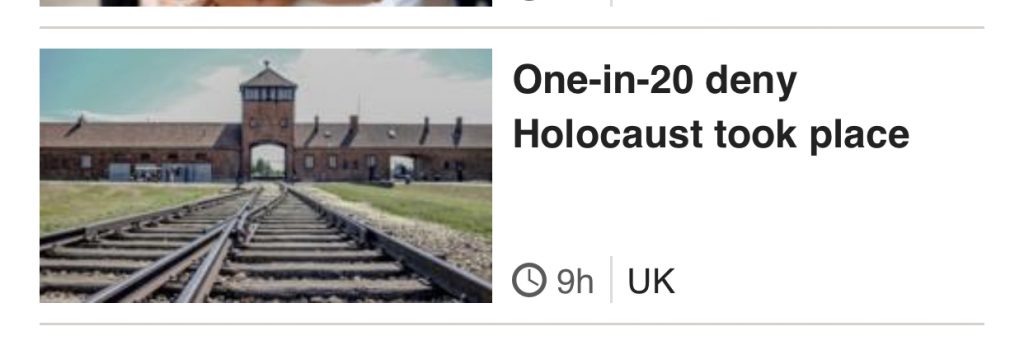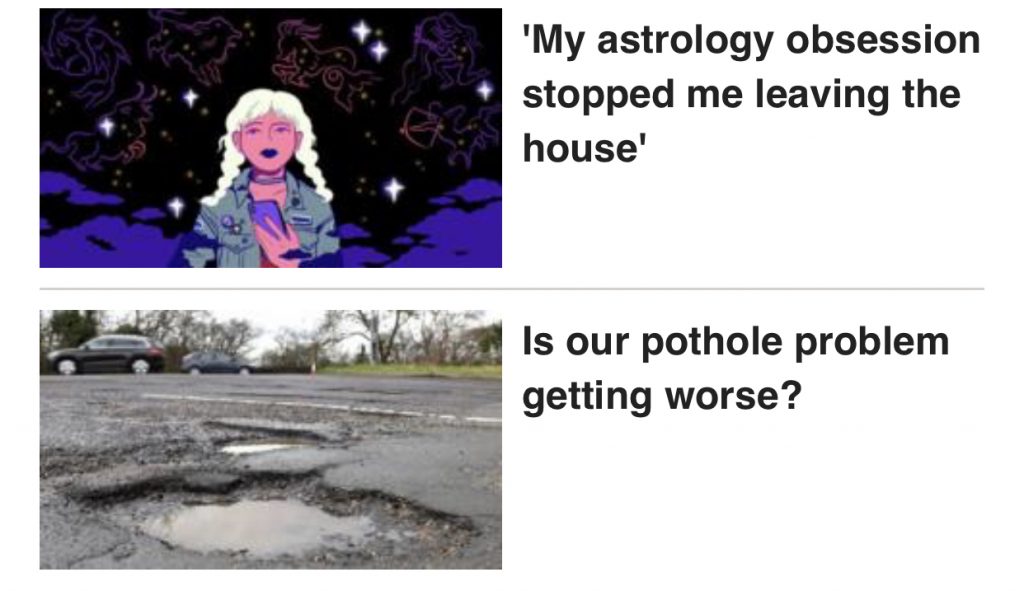Scanning down the BBC News headlines page I came across a few headlines that bothered me and I think they show a disconnect between what the public think and what is correct. This has always been the case but social media and the ease of connectivity now means that people who are wrong can gather together and think that being in a community of like-minded people means that their views are correct.

Apparently 5% of the population do not think the holocaust happened. Whether this is the same as denial I am not sure. Perhaps they just haven’t appraised the evidence. Apparently 45% of people polled didn’t know how many people were killed in the holocaust but I think that is more forgivable. To know something happened is one thing but to know numbers about it is another. As long as they all know it was a bad thing then we should be ok. There were 17 million victims in total.
What this news article seems to be pointing out is that we clearly are not learning from the mistakes of the past. We are also pretty poor at appraising evidence. Too many people don’t understand how to read articles critically and to appraise their sources of information. Too many people can easily be swayed by group-think and the idea that many people saying the same thing over and over must be right.
What’s more these people also probably don’t care that they are wrong. They are going to believe what they want because they can. They also probably think that there isn’t objective truth. They probably struggle to cope with the idea that they can be easily manipulated and are possibly being used by other forces or that they are just stupid. The reason we have experts in certain fields of human endeavour is so that not everyone needs to be an expert about everything. People should be accepting of allowing us to defer our human knowledge to people who have spent their lives pursuing the best-as-we-know-it truth in these matters. We also need to understand that it’s not just a single expert we should trust but the consensus view of the world of experts.
This is what science does. Science changes its views with evidence and sometimes it changes quickly and sometimes its a more gradual change but over time the direction of scientific knowledge is to getting things correct. In terms of history we should listen to the consensus view of academics while we learn more and more. In terms of economics we shouldn’t really listen to anyone because it’s not a science, more a dark art. In terms of Brexit we should listen to the lawyers, the economists and the scientists. We should not be listening to the MPs because they aren’t experts in those fields. They are people elected by us to represent us whom, we would think, have the best interests of the country and its citizens as a whole. But we should also recognise that they are human and so fundamentally flawed individually.
We also need to understand that sometimes we just won’t know and answer to a particular problem or that the question isn’t a valid question. Think about something from history, something like what Masham said to Queen Anne. We can’t know what was said but we can use the best evidence we have to try and build a picture. Think about the start of the universe, we have a pretty good idea of what happened and asking “what” is a very legitimate question. The problem with that one is asking “why”. Although why something happens is a legitimate question the answer is unknowable and this makes the question reasonably void. It is these gaps in answers to questions that humans don’t seem to like and in those are inserted many stupid theories along with the concept of god.
Education is how we get out of this. We need to educate the country in particular matters so that people understand why and how. This is not an easy process. To allow a decent explanation to the country on matters of importance with a series on TV or radio or the internet somewhere. Mind you, you can’t make the horse drink. Some people will choose to be willfully ignorant and others are just ignorant. Personally I think this is correlated to good effect with empathy, but that is something I haven’t investigated.

This is how it is done. We educate people. We let them understand the experiences. We talk to them. We hope they are willing to listen and learn. I do think, however, that there is an awful lot of the Dunning-Kruger effect going on with people who choose not to learn.

Two more headlines next to each other on the very same BBC News front pages as the others in this communication. I did not read each article and that may be the start of the problem but I want to point out the following:
Astrology is bollocks and, unfortunately, people fall for its charm and simplicity. Perhaps if we could educate people more about appraising evidence and understanding a little more physics we could kill off this bollocks and other religious bollocks too.
Finally, putting a question mark at the end of a headline does not good journalism make. It is really lazy. It implies that the answer is yes but also shows that the journalist doesn’t really have any proper evidence to answer the question because otherwise the question mark wouldn’t need to be there. If you have evidence then it is fact and you can write something like that as an indictment of underfunding of our roads. But if you are just using “anecdotal evidence”, or to give it its proper name; “anecdotes”, then you are just a lazy piece of shit and you shouldn’t be a journalist.
Always remember when your aunt starts telling you that she took activated carbon tablets and that cleared up her cancer that the plural of anecdotes is not evidence. People are flawed and terrible at understanding evidence. That is why science and experts exist.
